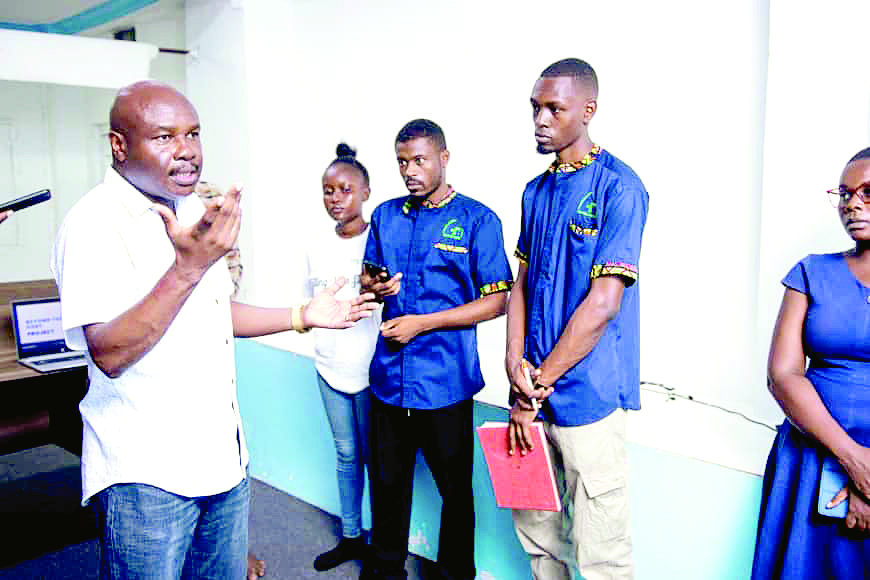Duo leverages internet to mint revenue via radio
By Jasmine.Atieno, August 3, 2023A recent report by the United Nations Development Programme (UNDP) reveals that the Blue Economy has great potential to contribute to higher and faster Gross Domestic Product growth in Kenya.
Innovation and growth in the coastal, marine and maritime sector could deliver food, energy and transport, among other products and services and serve as a foundation for sustainable development in the country.
With over 4.5 million people dependent on the marine economy, it is yet to yield its full potential due to many reasons, among them lack of public information. But in an effort to encourage more youths from the coastal region to explore and invest in the Blue Economy, journalism graduates from Mombasa, Gilbert Were and Joshua Muema have set up an online radio station as a bridge between the industry and the youth.

The Blue Radio Kenya’s on-air programmes take an exclusive interest in the Blue Economy. As the two young entrepreneurs share, the journey to launching the online radio started in 2019 after a pitch competition with Tech Bridge Hub.
Positive storytelling
“I wanted to do positive stories. They were looking for the best tech ideas, but I was coming in with an idea that was merging technology and media, and my pitch won,” shares Were.
From the competition, they were awarded Sh100,000 and a seed funding of Sh70,000, which helped them to set up their business.
“We basically started our operations from home. We had a laptop, and we would go to the field with our camera, get the stories we wanted, come home edit and publish,” shares Were, who is also the founder of Gilitics Media that later birthed Blue Radio Kenya.
At the peak of Covid-19 pandemic in 2020, the duo landed a contract job with Search for Common Ground Kenya, an international organisation that focuses on peace building, to work on a documentary.
This gig was worth Sh300,000 and a big breakthrough for them. The project was running from March to August 2020, and once they received their pay, they used the money to set up their first office.
From there it’s been many steps filled with determination, to learn and grow. This has included attending several trainings to perfect their entrepreneurial and business management skills.
“We wanted to set up a production company, but we still had other challenges though and we needed to have good audios and everything. So, when we got a call last year from Mahmoud Noor, the founder of Swahili Pot Hub and Pwani Innovation Week, inviting us to take part in the Pwani Innovation Week, we went for it. The big question for us was, what was this one thing we could come up with to improve our module? We immediately knew that it was time to talk about the Blue Economy. The idea had always been there with us since we started, but we just did not have the right platform,” shares Muema, the Blue Radio Kenya co-founder and chief executive officer.
Support and funds
Again, there were good tidings from the innovation week and with enough support and funds, the Blue Radio has been up and running from September 2022, with the target audience, as Muema shares, being Generation Z.
He says, “We are targeting young professionals and youth at the Coast, especially the Generation Z. They are the most users of smartphones and we want to channel this information directly to their gadgets. We are sharing with them about the different opportunities available in the blue industry. We are also inviting people from the industry who have the relevant information for our listeners to hold talks and direct engagements with our listeners.”
The reception for their media venture has been positive with different government bodies joining hands to work with them. Various industry stakeholders have been making the most of the platform as well. In 2022, the two entrepreneurs won the Under 30 Mediapreneur accolade at the Founder Of The Year Awards (Foya).
“It is so empowering to be able to reach young people who are working in those areas or who have interests in joining the industries within those areas. They are interested in the programmes we have been hosting because we have on-air marine experts that directly address their interests and concerns,” adds Muema.
Employment opportunities
The radio station has currently employed over eight permanent staff members, several correspondents and 11 journalism interns. Their dream is to set up a media organisation that could expand both their reach and revenue.
“The worry is that our content is still not reaching many ordinary citizens, especially those who cannot afford to pay for the internet in order to freely access online content. There are also those who do not have smartphones, while the Blue Economy covers even the people working as fishermen and vendors. If we could reach these people, we are sure we could be in a position to scale up our operations, create more job opportunities for young people, and grow our revenues as well,” says Were.
